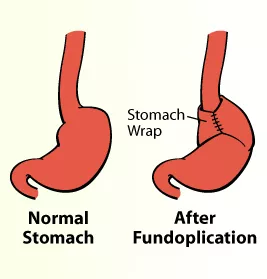Gastroesophageal Reflux Disease (Pediatric)
What causes gastroesophageal reflux disease?
Gastroesophageal reflux (GER, aka acid reflux or acid regurgitation) occurs when the opening to the stomach (lower esophageal sphincter, LES) doesn't close completely, causing food and digestive acid to rise up into the esophagus. Gastroesophageal reflux is common in babies and can be normal. Majority of “spit-ups” in babies resolve when they are greater one year of age.
However, persistent acid reflux is considered Gastroesophageal Reflux Disease (GERD) and can eventually lead to more serious health problems including esophagitis, when the acid irritates the inner lining of the esophagus, causing pain and trouble swallowing. When gastroesophageal reflux results in persistent vomiting, the vocal cords and small airways of the lung can become irritated leading to aspiration pneumonia and breathing problems which can be mistaken for asthma. In addition, persistent vomiting can lead to poor growth and failure to thrive.
Gastroesophageal reflux is common in children with certain birth defects, including esophageal and diaphragmatic birth defects.
How is gastroesophageal reflux disease diagnosed?
If gastroesophageal reflux disease is suspected, sometimes, we recommend additional tests to determine the severity of the condition. Your child’s pediatric surgeon will determine whether these tests are needed for your child based on her/his symptoms.
- Swallow study
- Upper gastrointestinal (GI) contrast study
- 24-hour pH monitoring
- Upper GI endoscopy (direct telescopic visualization)
- Gastric emptying study
How is gastroesophageal reflux disease treated?
Medical non-operative treatment
Initial treatment for GERD is usually medical non-operative treatment. In infants, this includes upright positioning and thickened feedings with or without the addition of medicine that helps the stomach empty (Reglan®). In addition, medications that reduces the acid in the stomach contents, such as H 2-blockers, (famotidine), and proton-pump inhibitors (omeprazole and lansoprazole), are prescribed. Most infants respond to medical treatment and do not require a surgical procedure.
Fundoplication

Fundoplication is recommended for children who have complications or persistent symptoms related to GERD that are not improved by medication. Symptoms of gastroesophageal reflux disease include vomiting, esophagitis (heart burn) gastroesophageal stricture, recurrent pneumonia, breathing problems, and inadequate growth.
The goal of a fundoplication is to prevent stomach contents from refluxing back up to the esophagus. This operation is accomplished by wrapping the upper portion of the stomach around the lower portion of the esophagus, tightening the outlet of the esophagus as it empties into the stomach. After a fundoplication, food and fluids can pass into the stomach but are prevented from returning back up the esophagus. In most cases, a fundoplication can be performed by a pediatric surgeon using a small telescope and miniaturized instruments placed through four to five band-aid sized incisions on the abdomen.
How long will my child remain in the hospital after the operation?
Most children are ready to go home in two to three days after the operation once he/she is back to normal feeding regimen. In some younger patients, a gastrostomy tube is placed into the stomach during the same time of fundoplication to allow feedings to be administered and air to be released. Air release is called "venting". It may be hard for your child to burp for many weeks after a fundoplication. Venting allows air to leave the stomach, which decreases bloating and keeps your child comfortable. During your child's hospital stay, the bedside nurse will teach you how to vent, care for and use the gastrostomy tube.
What is expected after surgery?
If your child is to resume his or her usual diet, it is best to start slowly. Begin with liquids, advance to soft foods, and then to a regular diet. It may take several weeks for the postoperative swelling to subside and for solid foods to pass easily into the stomach. Foods that cannot pass into the stomach will be vomited up. It is not unusual for this to occur from time to time in the first few weeks after surgery.
Fundoplication may have long term complications including gas bloat, difficulty swallowing, and unwrapping or slipping. If you think your child is experiencing problems because of the fundoplication, call our office.
